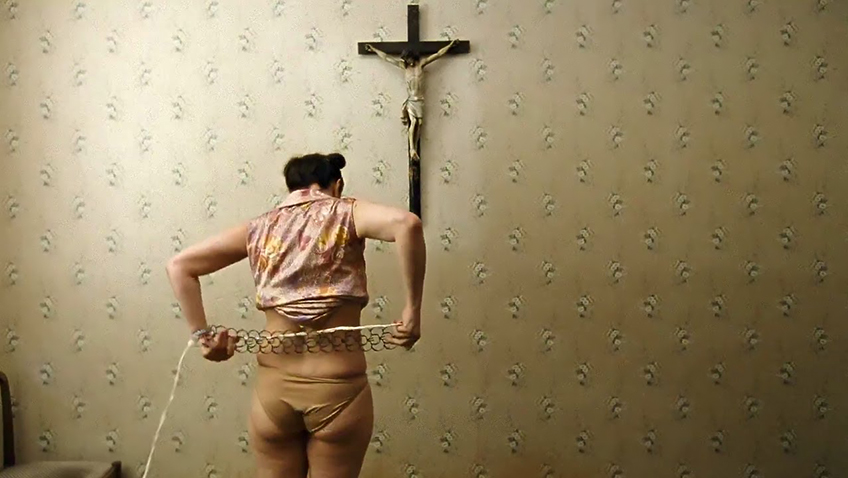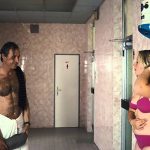Joyce Glasser reviews Paradise: Faith (Paradies: Glaube) (July 5, 2013) Cert. 18, 112 min.
Paradise: Faith is the second in Austrian writer/director Ulrich Seidl’s trilogy about lonely, overweight, middle-aged women whose sublimation of their frustrations and anxieties manifests itself in unhealthy ways. Maria Hofstätter plays Anna Maria, the sister of the woman in Paradise: Love who became a sex-tourist on her Kenyan holiday, turning her quest for love and companionship into undignified, mechanical sex with unscrupulous young native men. As the title suggests, Anna Maria’s crutch in Paradise: Faith
is her relationship with Jesus, which, despite its rocky patches, turns out to be a lot easier than an abusive marriage with a wheel-chair bound Muslim man (Nabil Saleh).
Like her sister, who cares for mentally ill adults, Anna Maria has a responsible, caring job as a radiologist in a hospital. She tells a colleague that she is staying home for her holiday, and, for the remainder of the film, we experience her busy schedule of scrubbing her floors; solitary and group prayer; missionary work, and caring for an estranged, paraplegic husband who suddenly reappears in their home after an unexplained absence, hoping to resume sexual relations.
As part of her missionary work, which apparently is common in Austria, she drags around a statue of the Virgin Mary to the homes of lapsed Catholics, the results of these home visits injecting some welcome black humour into the grim proceedings. In one visit, she argues with a respectable couple that they are living in sin because they are not married. Her warnings seem misplaced as the man is a widower, the woman is divorced from an abusive husband and they are both in their sixties. Later Anna Maria battles with an Eastern European sex worker intent on drinking herself into a stupor. Here, the woman clearly needs help, but Anna Maria’s approach is too heavy-handed to be effective. You cannot help thinking, ‘methinks she doth protest too much.’
As with Seidl’s previous films, watching Paradise: Faith is hard going. While we are, for the most part, spared the humiliation of the nude sexual scenes in Paradise: Love, we are subjected to Anna Maria stripping to flagellate herself, crawling around her house on her knees, licking a statuette of Jesus and arousing herself with his cross. Carnal sex and nudity are not altogether absent, as Anna Maria runs home in horror at the sight of an outdoor moonlight orgy, clearly stimulated by what she has witnessed.
Hofstätter, who has worked with Seidl since his controversial film Dog Days in 2001, not only knows his style but obviously trusts the director, enabling her to fill the screen with a gripping tension absent from the plot on paper. She carries the film with her unflinching performance that in other hands, might have evoked laughter or pity. All of the supporting performances are excellent, too, with special mention for Saleh, a non-professional actor who is a 50-something Muslim but not a paraplegic.
While the focus is on the women – and what the actresses are put through, is disturbing, there is no denying the power of Seidl’s disquieting, naturalistic style. It might take these voyeuristic films that expose self-destructive behaviour to appreciate the close, but mysterious, relationship between the mind and the body in all of us.
You can watch the film trailer here:





